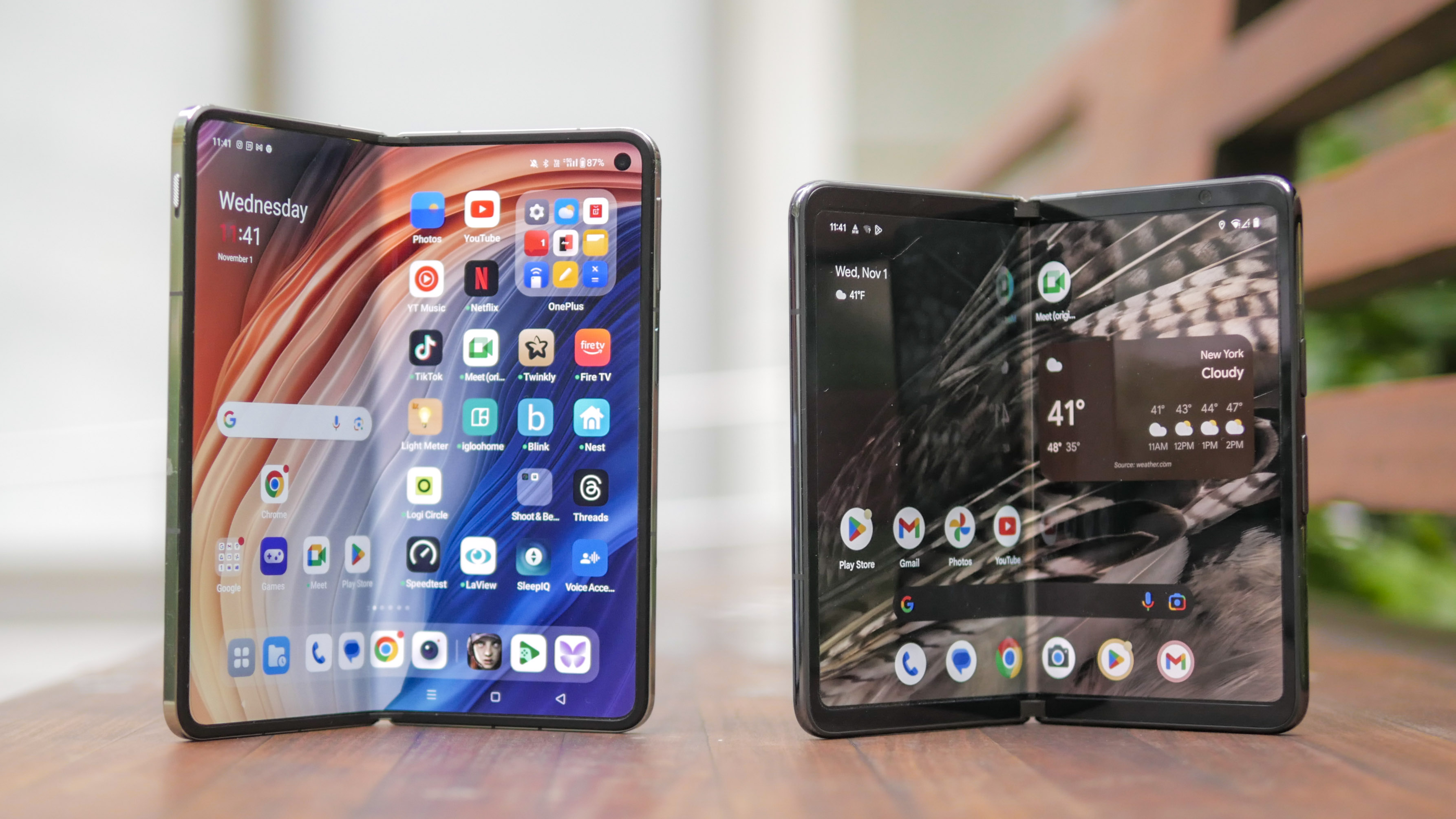
The OnePlus Open is an impressively designed foldable phone that's thin and light. It's also armed with an excellent triple camera system and has one of the best multitasking experiences around.
For
- Outstanding thin, light design
- Dynamic Open Canvas multitasking
- Long battery life and fast charging
- Generous 512GB storage
Against
- Weak low light camera performance
- No wireless charging
Google's Pixel Fold has everything you need in a foldable phones. Its size is perfect for one-handed usage, while its 5x optical zoom camera lets you get closer to your subjects than on other foldables.
For
- Wide front display
- Intuitive multitasking
- Strong cameras
- Good battery life
- Lots of optimized apps
Against
- Very expensive
- Large bezels
- Some apps don't fill the screen
- Ho-hum performance
The world of foldables took an interesting, new turn this year with models from other than Samsung. Both the OnePlus Open and Google Pixel Fold are widely considered two of the best foldable phones released this year. But with money tight right now, consumers shopping for a foldabe want the device that delivers the most value — something our OnePlus Open vs Pixel Fold face-off can help determine.
In Tom’s Guide’s Pixel Fold review, we praised Google’s efforts in designing its first foldable phone — complete with a class-leading 5x optical zoom camera. Paired with intuitive multitasking and lots of optimized apps, it’s a workhorse for anyone looking for a hybrid device that functions both as a phone and tablet.
But OnePlus didn’t disappoint with its first effort at a foldable, either. In my OnePlus Open review, I raved about the phone's thin and light design, long lasting battery life, and the utility of its cameras.
My colleague, Richard Priday, ended up giving the nod to the newcomer in his OnePlus Open vs. Galaxy Z Fold 5 comparison. But now it’s time for me to see which one comes out on top in this OnePlus Open vs. Google Pixel Fold face-off — all to settle the argument of which is the best foldable for your needs..
OnePlus Open vs. Pixel Fold: Specs
OnePlus Open vs. Pixel Fold: Price and availability
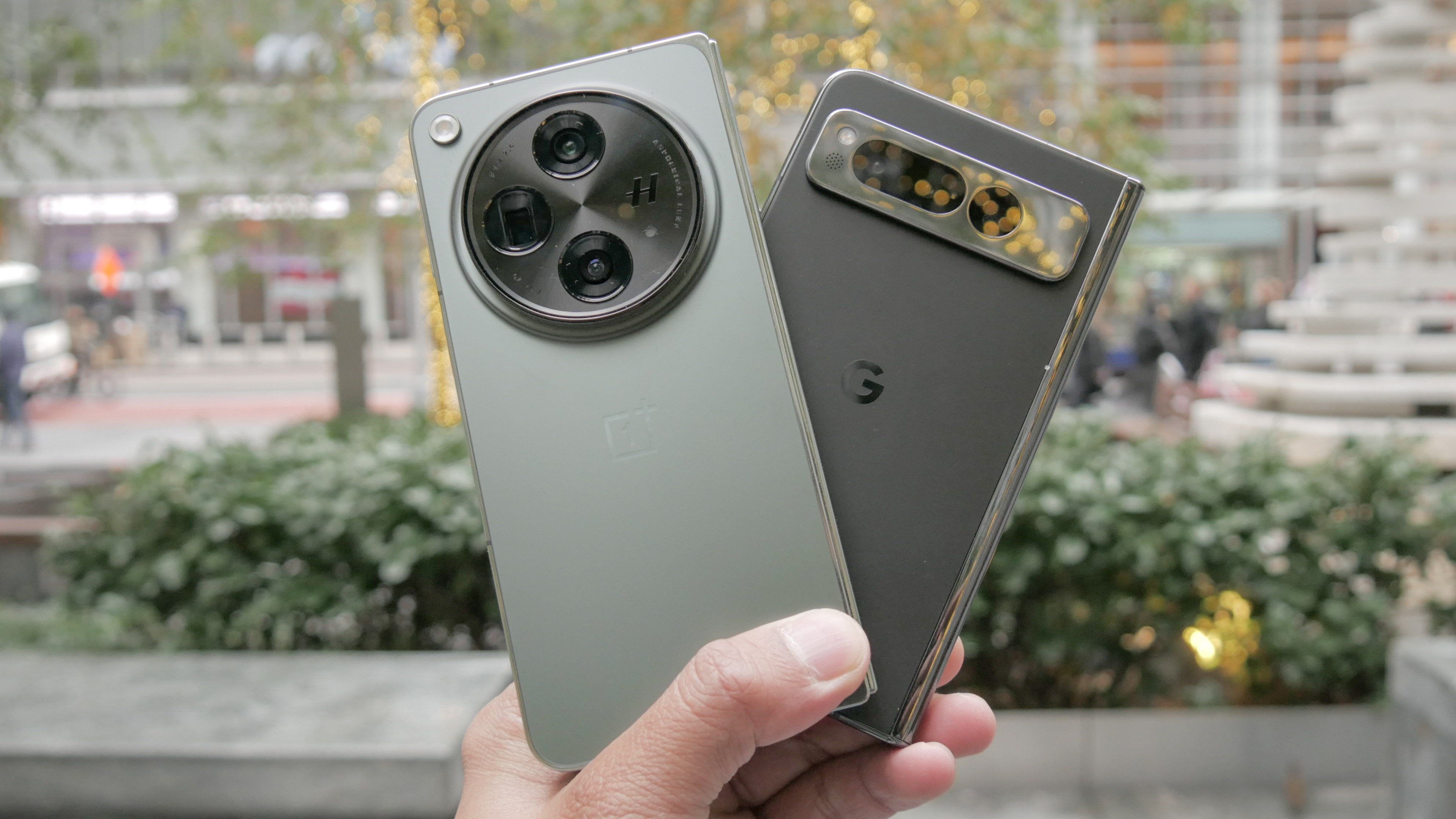
On paper, the OnePlus Open has a slightly lower price of $1,699, which is $100 less than the $1,799 cost of the Pixel Fold. Paired with OnePlus’ lifetime offer of a $200 trade-in credit for any phone in any condition, the price of the OnePlus Open is effectively brought down to an impressive $1,499. Both phones are available right now, but you’ll find the Pixel Fold sold at more wireless carriers and retailers.
With such a wide gap, it makes the OnePlus Open more attractive to consumers who are pinched. It’s made more poignant when you look at their specification in the next section below because the OnePlus Open comes with 512GB of storage — whereas the Pixel Fold starts off at 256GB.
Winner: OnePlus Open
OnePlus Open vs. Pixel Fold: Design
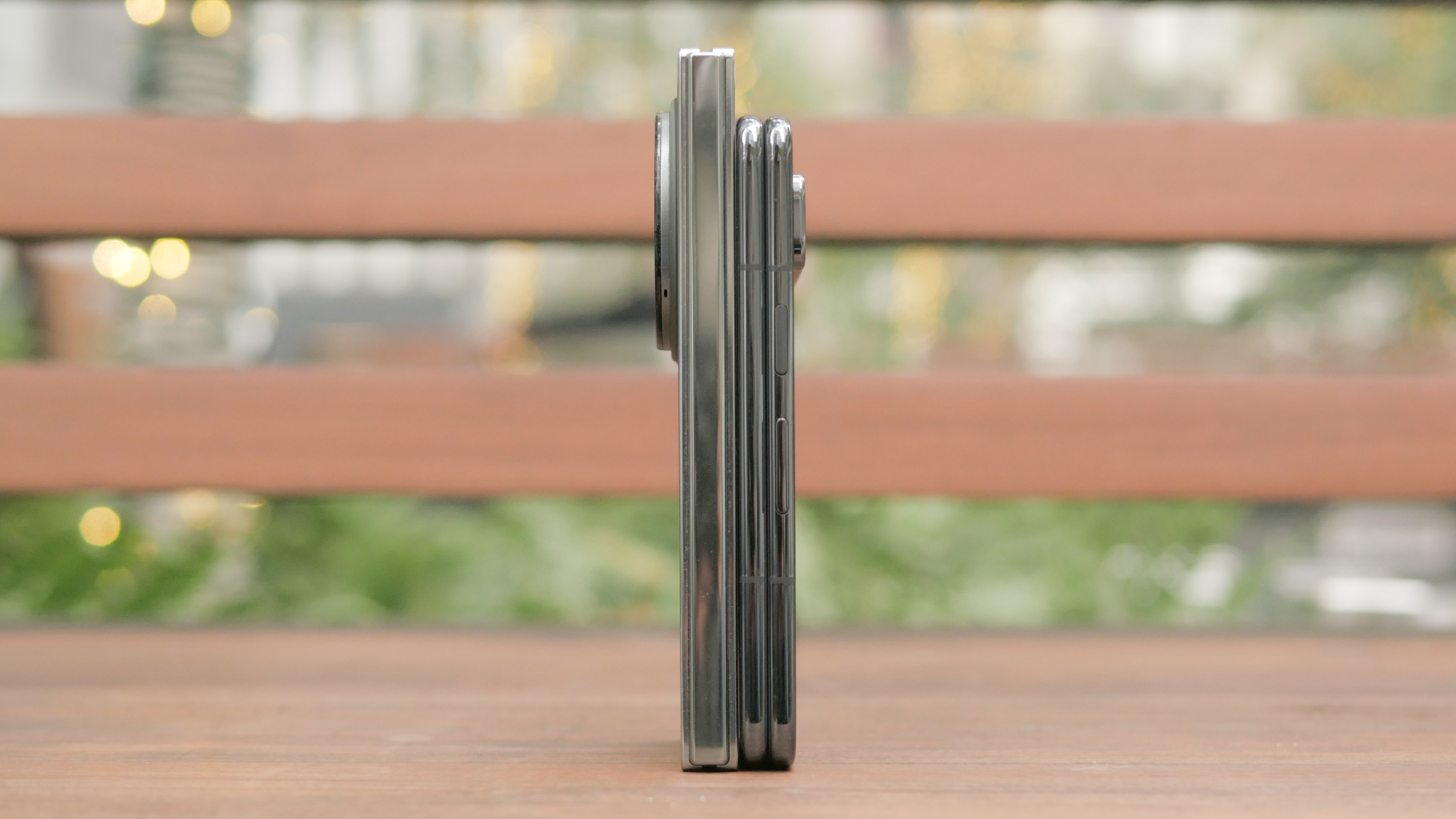
Both phones are premium in every way, but I’m reeled in most by the thin and lightweight design of the OnePlus Open. Sure, I like how the Pixel Fold’s easier to handle one-handed because it’s not as tall, but the OnePlus Open looks better aesthetically with its matte glass meets metal trim construction — which I admit is more smudge resistant than the Pixel Fold’s matte glass and polished aluminum body.
The OnePlus Open is also noticeably lighter at 8.43 ounces. After being accustomed to this, the 10-ounce Pixel Fold feels significantly more weighty. Another noteworthy thing to point out using the two foldable phones is how there’s less of a crease with the OnePlus Open’s inner display, despite the fact that the two both offer gapless hinges.
Overall, it’s tough to overlook how the OnePlus Open looks and feels like a more refined notebook styled foldable.
Winner: OnePlus Open
OnePlus Open vs. Pixel Fold: Display

If you prefer larger displays, then the OnePlus Open is the one for you. It features a larger 7.82-inch Flexi-fluid AMOLED display while the Pixel Fold features a 7.6-inch OLED. Our display benchmark testing revealed that the OnePlus has the brighter main screen with a peak brightness of 1,158 nits. It’s a smidge better than the Pixel Fold’s mark of 1,000 nits, but I find it honestly hard to tell the difference when looking at both screens.
The OnePlus Open also has the larger outer display, a 6.31-inch Super Fluid AMOLED. Since it’s taller and narrower, I find it tougher to reach the top corners of the Open's exterior display. And even though the Pixel Fold has a smaller 5.8-inch OLED outer screen, it’s technically brighter at 1,172 nits, which makes it much more visible than the 721 nits produced by the OnePlus Open.
In addition to how I prefer the more subtle-looking crease of the OnePlus Open, the bezels around the inner display are much thinner. The Pixel Fold’s bezel is distracting to the eye, which is why I prefer the displays of the OnePlus Open by and large.
Winner: OnePlus Open
OnePlus Open vs. Pixel Fold: Cameras
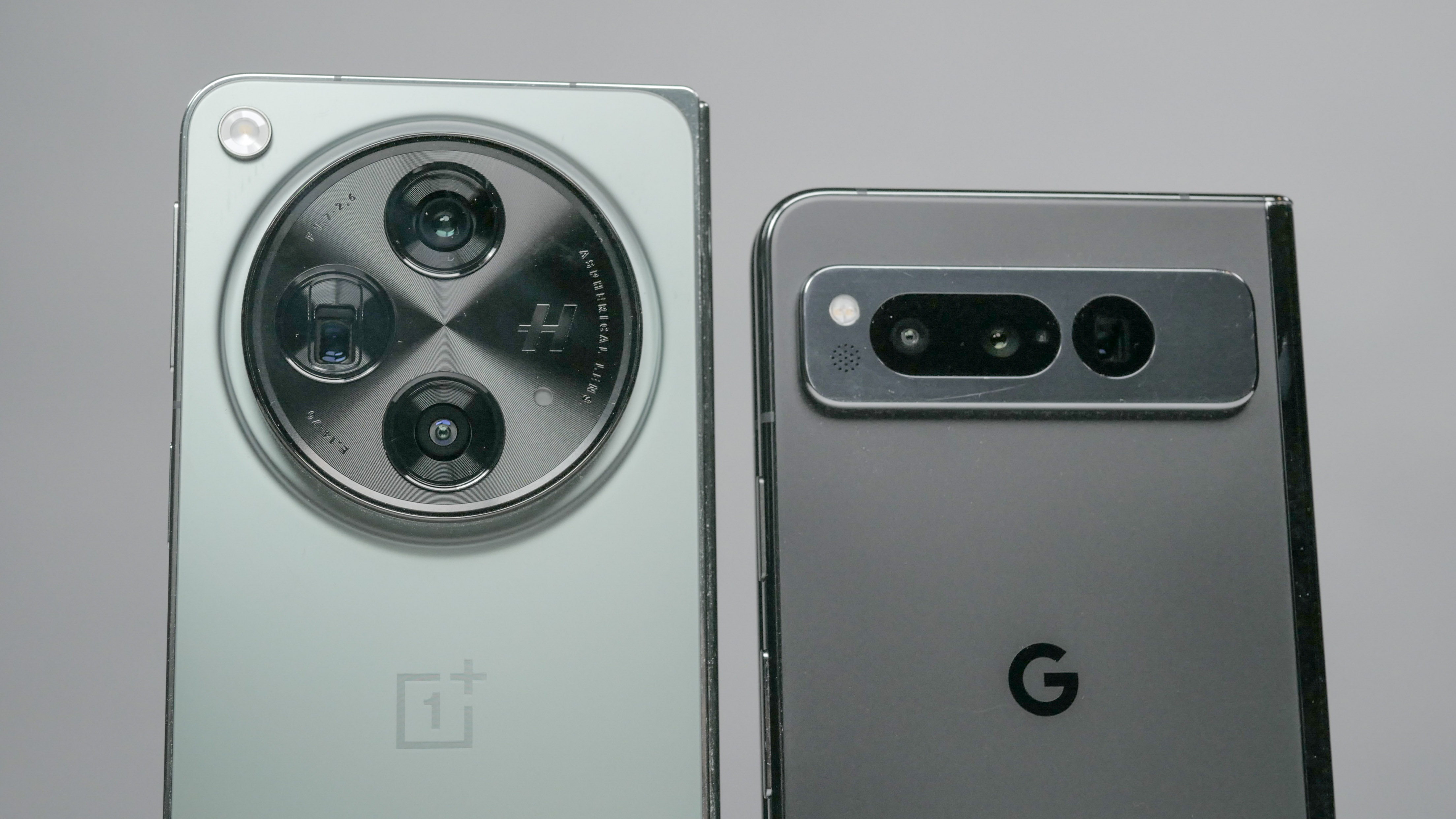
This is probably the one area that matters to the most people because let’s face it, a terrible camera performance is a big dealbreaker. Both foldables are armed with formidable triple camera setups that offer plenty of utility to capture near and far subjects.
Starting with the OnePlus Open, you get a main 48MP main camera, 48MP ultrawide shooter, and a 64MP telephoto lens with 3x optical zoom. All of this is somehow compressed into a circular housing, which gives the phone a ridiculous-looking camera hump that sticks out a lot more than most phones.
In comparison, the Pixel Fold’s camera arrangement isn’t as outrageous-looking because the strip-style layout takes up a smaller amount of space. It features a 48MP main sensor, 10.8MP ultrawide shooter, and a 10.8MP telephoto lens with a 5x optical zoom. The latter’s worth pointing out because it’s better than the 3x optical zoom of the OnePlus. However, you shouldn’t lean into the numbers a whole lot because there’s more to this OnePlus Open vs Galaxy Pixel Fold photo face-off than meets the eye.
Starting off with their main cameras, I would argue that the OnePlus Open offers the better dynamic range. In the first set of images of a sign by the beachside, the vibrant green color of the grass stands out. The general exposure of the shots from the OnePlus is much better because the Pixel Fold is a smidge under exposed. Details are good with both, but again the richer color tones and wider dynamic range performance of the OnePlus gets my attention.
I also like how portrait photos look better with the OnePlus. For starters, the Pixel Fold crops the photo even when the zoom is set to 1x — resulting in a tighter shot. Both phones add that creamy level of bokeh to the background, but the two have plenty of detail, with the Pixel Fold adding a little bit of over sharpening.
For selfies, I really recommend using the main cameras of each device in selfie mode, but if you insist on using their true front-facing cameras, I like the results from the OnePlus more. Details are noticeably sharper than what the Pixel Fold produces, and it also has a slightly wider field of view as well, making it more suitable for group photos.
What’s really remarkable is how the OnePlus Open’s 3x optical zoom camera matches the superior spec’d 5x optical zoom of the Pixel Fold. In making it a proper comparison, I captured the photo below at 5x zoom with both phones. Of course, the OnePlus leverages its own lossless zoom formula to deliver the same amount of detail. It’s shockingly good that I prefer it in each and every telephoto photo I capture against the Pixel Fold.
I wouldn’t say low light is a specialty of either foldable phone, but if I have to pick, I would lean on the Pixel Fold for the occasion. I don’t like how Night Sight crops the photo, but the exposure is slightly better than the OnePlus Open — and that’s despite its odd colors.
Video recording performance is a close one, with either phone coming out on top. Upon closer inspection, however, I’d give it to the OnePlus Open mainly for its stronger contrast and brighter exposure. I also prefer the OnePlus for video largely for its richer shooting modes, including Movie Mode for that cinematic 24fps look.
Winner: OnePlus Open
OnePlus Open vs. Pixel Fold: Performance

I’m not one to solely judge a phone’s performance strictly based on synthetic benchmark tests, but the results are favorable to the OnePlus. In almost every test, the Snapdragon 8 Gen 2 powering the OnePlus Open came out on top. For example, it delivers a better score of 4,203 in Geekbench’s multi core test — while the Tensor G2 chip of the Pixel Fold reaches a score of 3,291.
As for graphics processing, the OnePlus Open again proves it’s far more equipped for gaming with its smoother 84.8 fps frame rate with 3DMark Wild Life Unlimited. In comparison, the Pixel Fold churns out a choppier rate of 40.4 fps running the same test.
For some strange reason, the OnePlus takes longer to render video in Adobe Premiere Rush with its time of 68 seconds. The Pixel Fold is able to render the same video at a slightly shorter 60 seconds, but I don’t think it’s significantly better.
Beyond benchmark testing, I will admit that both foldable phone are equally snappy and responsive. Even when I run multiple apps, neither one is bogged down by slowdown or lag. Their 120Hz display refresh rates certainly have something to do with that.
Winner: OnePlus Open
OnePlus Open vs. Pixel Fold: Battery life and charging
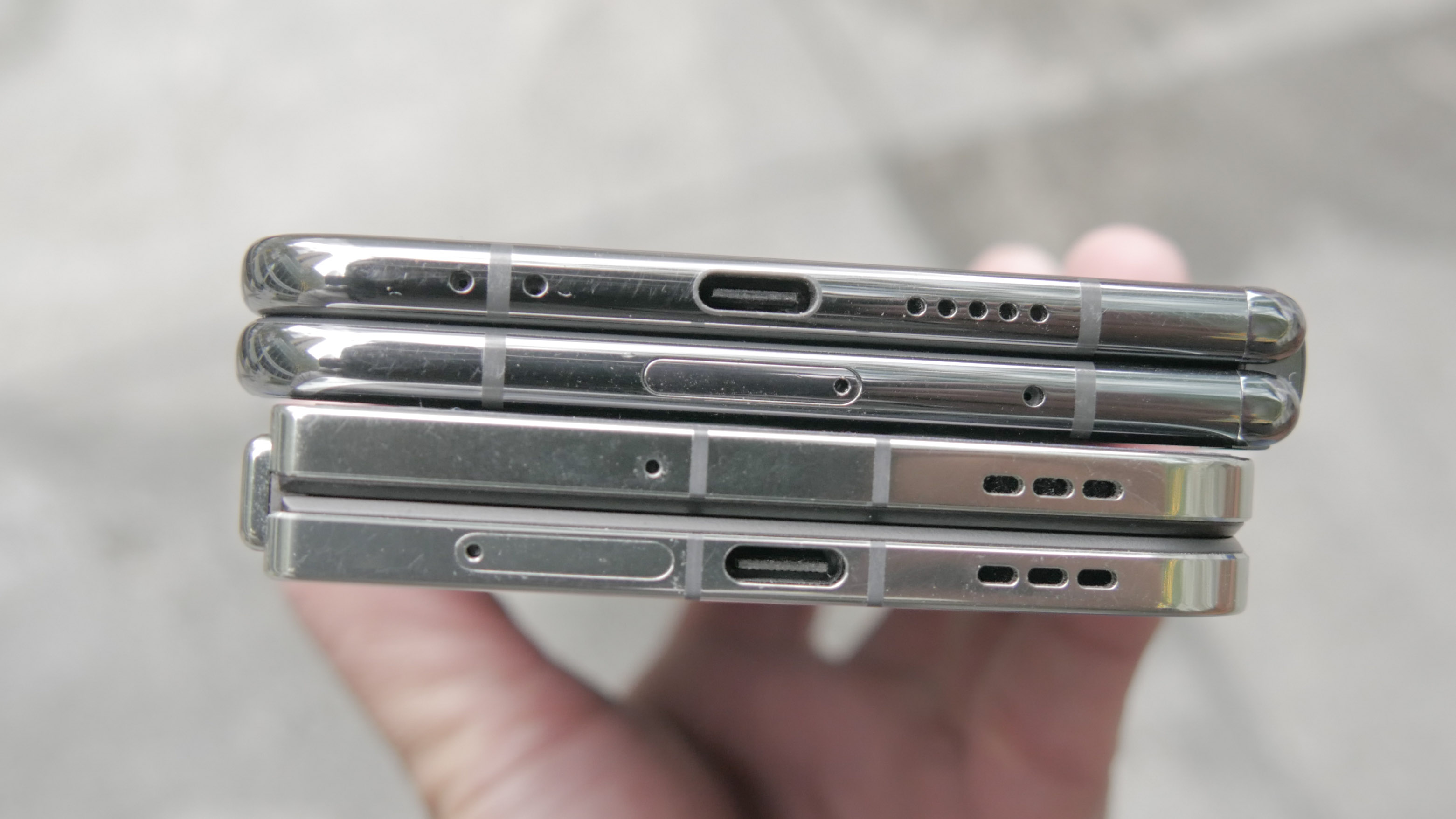
Foldable phones aren’t known for their endurance, but it’s mind boggling to see such a disparity between these two. Surprisingly enough, the OnePlus Open's 4,805 mAh battery propels it to new heights with its runtime of 11 hours and 45 minutes on Tom’s Guide’s battery benchmark test. That’s nearly 2 hours longer than what the 4,821 mAh battery of the Pixel Fold could muster. The Fold lasted 9 hours, 46 minutes on the same test.
In daily usage — a less exact and less demanding metric — the Pixel Fold tapped out well short of my bedtime while the OnePlus still had gas in the tank at roughly 10% capacity.
On top of its impressive run time, I’m also shocked by how fast the OnePlus charges with its included power adapter. The OnePlus Open supports 67W wired charging through its USB-C port, while the Pixel Fold charges slower at 30W. Due to this, the OnePlus is able to get to 50% capacity after 15 minutes of charging, with the Pixel Fold reaching 26% after the same time.
If there’s one thing missing from the OnePlus Open, it’s wireless charging support. Existing OnePlus owners have been clamoring for years now for OnePlus to bring this feature, which I think should be standard in premium priced phones. You certainly have the convenience of wireless charging with the Pixel Fold.
Winner: OnePlus Open
OnePlus Open vs. Pixel Fold: Software and special features
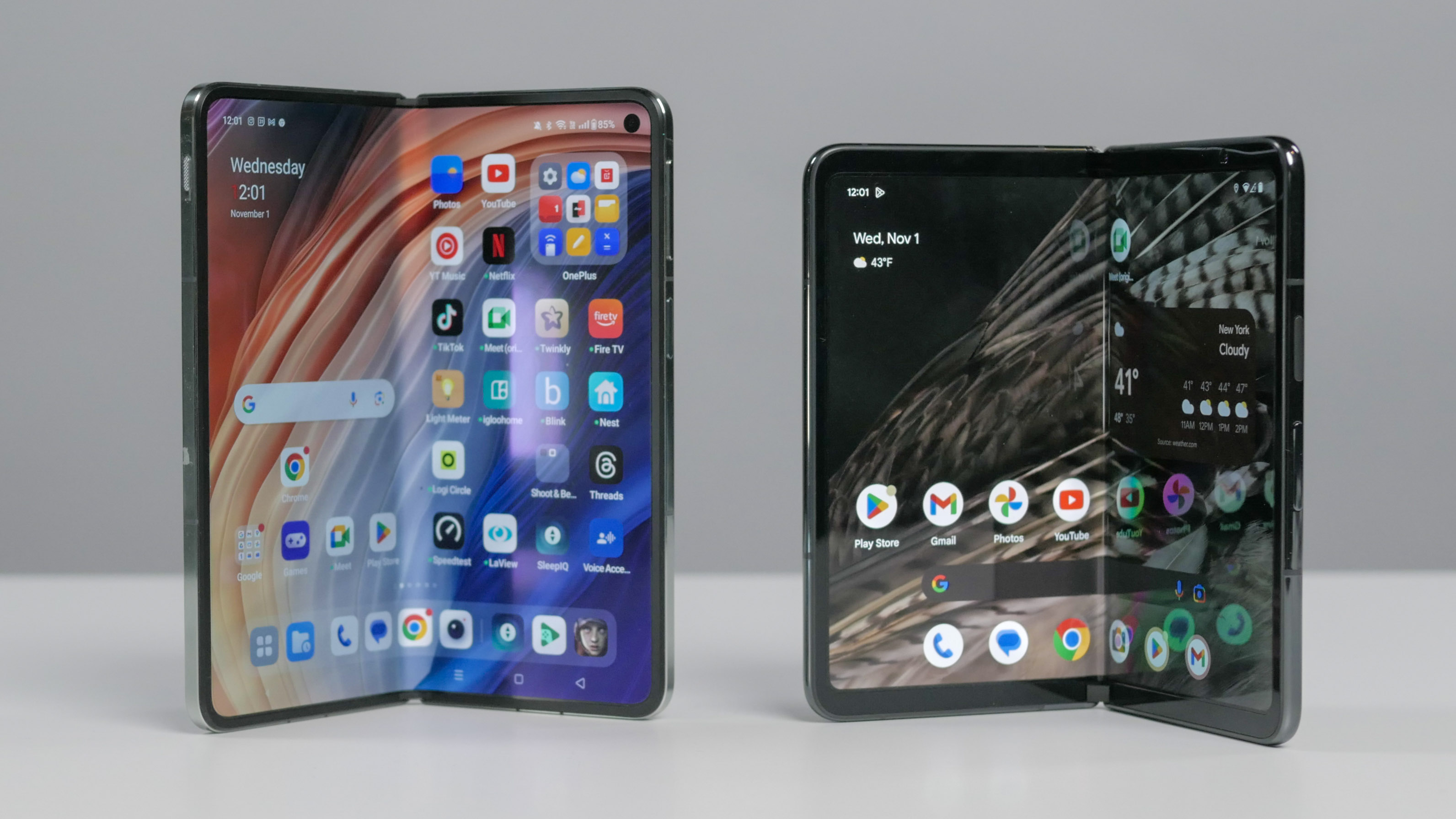
I’m always impartial to the stock Android experience, which is why I prefer the cleaner aesthetics of Android 13 running on the Pixel Fold. But that’s pretty much where it ends because despite their heavy focus on multitasking, OnePlus’ interpretation is much better.
Both phones offer conveniences such as the drag-and-drop gesture between two apps, but the OnePlus Open supports up to three apps simultaneously with its multitasking, making it far more useful than the Pixel Fold’s two apps support. The Open Canvas feature of the OnePlus makes for a much more satisfying experience than what the Pixel has to offer.
Open Canvas is OnePlus’ spin on multitasking, and I cannot tell you how much improved it is over the Pixel Fold's multitasking features. Open Canvas dynamically lays out the apps, which it will do on its own to provide the most optimized experience. If an app is optimized for full-screen view, the Open will shift it over to the side when you’re running another app — and the full-screen view comes back when you click back on it.
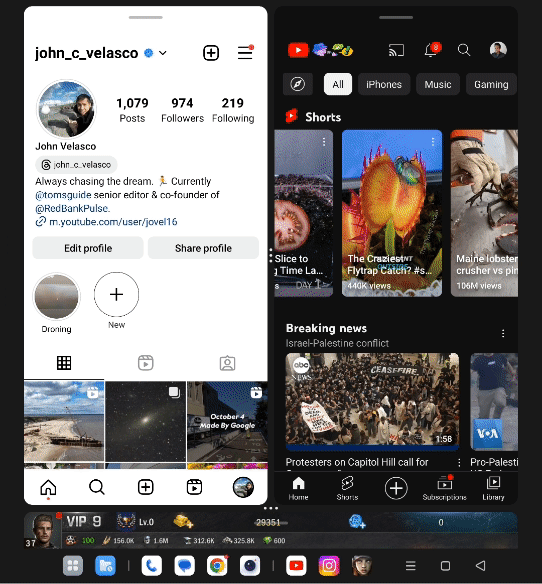
It’s hard to describe, but you can see it in action for yourself in the gif animation above. Another point I want to make is that I can save these three-app arrangements as a preset, with the ability to set up to nine multi-app presents for extreme multitasking. This is by and large a big difference compared to how the Pixel Fold handles multitasking.
Lastly, there’s video-out screen mirroring support with the OnePlus Open via USB-C. I know it’s not a feature a lot of people would use, but I find value in the fact that it essentially transforms the OnePlus Open to a desktop PC setup if you’re inclined. You can’t do this with the Pixel Fold.
Winner: OnePlus Open
OnePlus Open vs. Pixel Fold: Verdict
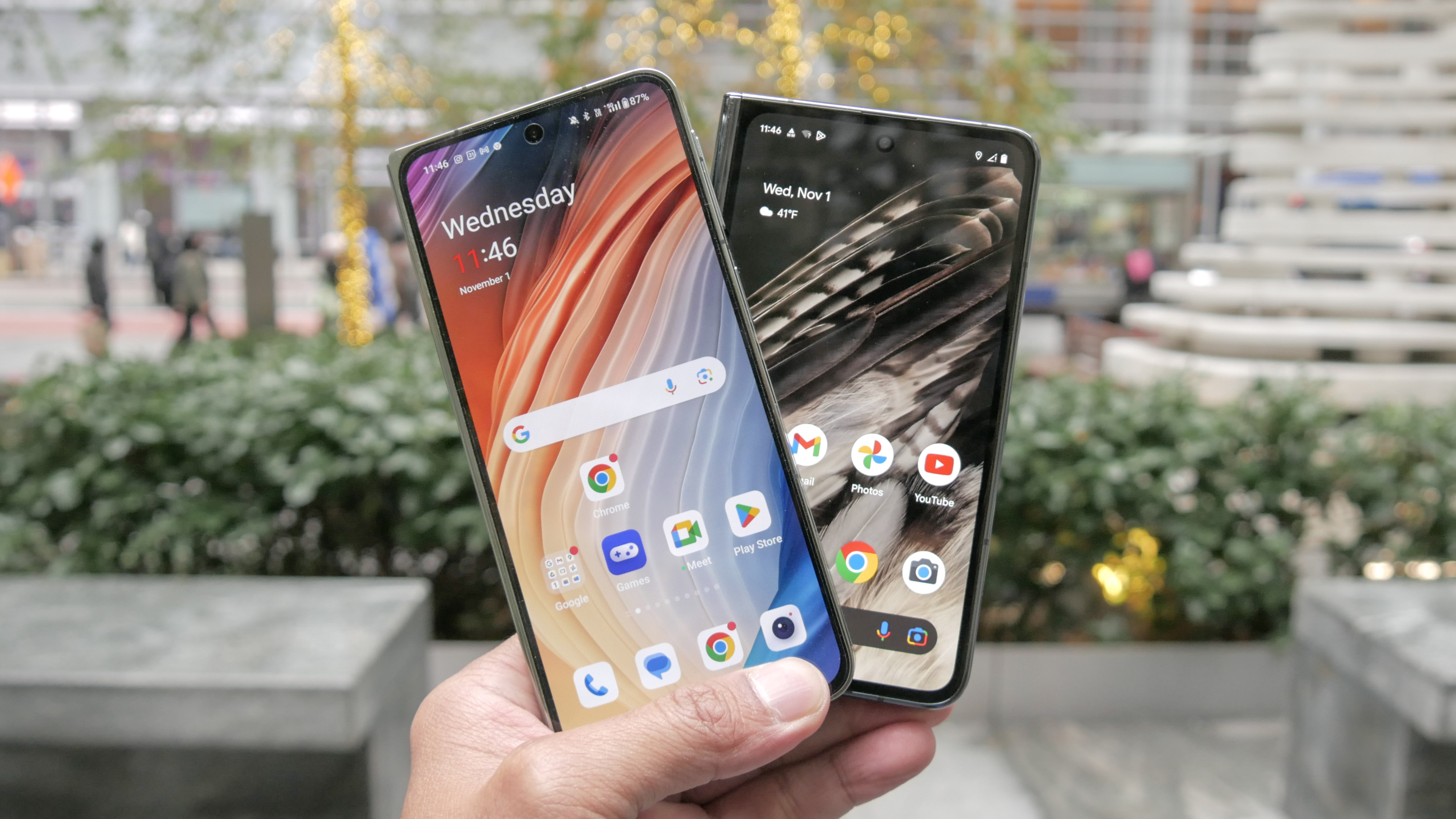
Based on the verdict with each section, this is a one-sided affair that shows how much the OnePlus Open crushes its competition. Apart from the fact that it’s missing wireless charging, it easily bests the Pixel Fold in every category.
This is a stark reminder how much the foldable space has transformed in the last 12 months alone. Google’s first stab with the Pixel Fold was a good attempt, but the OnePlus Open rewrites everything I expect out of a foldable phone.
Not only does the Open beat the Pixel Fold in areas I didn’t think it had a chance, like the camera department, but the fact that it’s essentially $300 adds a ton more value to the OnePlus Open.







